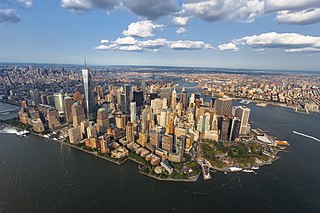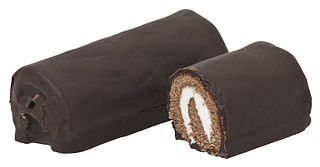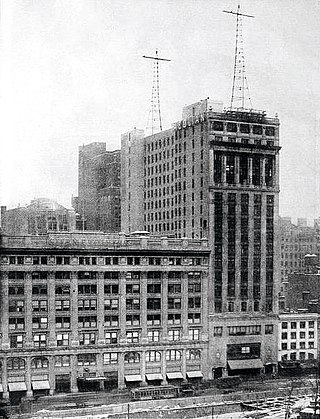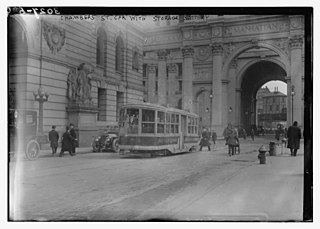
Lower Manhattan, also known as Downtown Manhattan or Downtown New York, is the southernmost part of Manhattan, the central borough of New York City. The neighborhood is the historical birthplace of New York City and for its first 225 years was the entirety of the city. Lower Manhattan serves as the seat of government of both Manhattan and the entire City of New York. Because there are no municipally defined boundaries for the neighborhood, a precise population cannot be quoted, but several sources have suggested that it was one of the fastest-growing locations in New York City between 2010 and 2020, related to the influx of young adults and significant development of new housing units.

The Brooklyn Rapid Transit Company (BRT) was a public transit holding company formed in 1896 to acquire and consolidate railway lines in Brooklyn and Queens, New York City, United States. It was a prominent corporation and industry leader using the single-letter symbol B on the New York Stock Exchange.

Drake's is a brand of American baked goods. The company was founded by Newman E. Drake in 1896 in Harlem, New York, as The N.E. Drake Baking Company, but it is now owned by McKee Foods. The company makes snack cake products such as Devil Dogs, Funny Bones, Coffee Cakes, Ring Dings, and Yodels. Drake's has traditionally been marketed primarily in the Northeastern U.S., but it expanded to the Mid-Atlantic and Southeastern U.S. regions in 2016. The products are made under the Orthodox Union kosher certification guidelines.

Stern's was a regional department store chain serving the U.S. states of New York, New Jersey, and Pennsylvania. The chain was in business for more than 130 years.

Saks, Inc. was an American holding company founded in 1919. Before acquisition by the Canadian-founded Hudson's Bay Company in 2013, it held ownership of department store chains including New York City-based Saks Fifth Avenue (1998–2013) and Tennessee-based Proffitt's (1919–2005). It acquired several mid-range department store chains in the 1990s, however, refocused on upscale retailing and divested of them in the mid-2000s.
State Street may refer to:

Einstein Bros. Bagels is an American chain of bagel cafes. In the 1990s, the company bought out several retail bagel chains from regions around the US which lacked bagel traditions. After filing for bankruptcy in 2000, the company was bought out by New World Coffee. It became part of Panera Brands in August 2021.
Melville Corporation was a large retail holding company incorporated by Ward Melville in 1922 from Melville Shoe Company. Formerly based in Rye, New York, it became CVS Corporation in 1996 under a massive reorganization plan. The company traded on the New York Stock Exchange (NYSE) under the ticker MES, before changing its ticker to CVS.

Bonwit Teller & Co. was an American luxury department store in New York City, New York, founded by Paul Bonwit in 1895 at Sixth Avenue and 18th Street, and later a chain of department stores.

Lechmere was a Massachusetts-based chain of retail stores that closed in 1997. At the time of its closing, it had 27 stores, including 20 in New England. The chain offered electronics, appliances, and various household goods. It also had locations in New York and the Southeastern United States.

The New York Railways Company operated street railways in Manhattan, New York City, between 1911 and 1925. The company went into receivership in 1919 and control was passed to the New York Railways Corporation in 1925 after which all of its remaining lines were replaced with bus routes.

The Allerton Hotel for Women, today known as Hotel 57, is a hotel located at 130 East 57th Street in the New York City borough of Manhattan. It is a seventeen-story brick, limestone, and terra cotta building designed by Arthur Loomis Harmon in 1920. It was built on the southwest corner of Lexington Avenue and 57th Street by the Allerton House Company at a cost of $700,000. It originally had stores on its ground floor. The hotel intended to accommodate six hundred business and professional women and also shelter young girls. When completed in 1923, the Allerton Hotel had room for four hundred tenants. Its occupancy was filled prior to completion and there was a long waiting list. After opening it was so popular that another establishment of its kind was anticipated.

The Marbridge Building is an office building at 1328 Broadway, on the east side of Sixth Avenue between 34th and 35th Streets in Herald Square, Manhattan, New York City. It opened in 1909, an 11-story structure, utilized in part by men's clothier Rogers Peet. Until October 1910 it stood opposite the Alpine apartment house, which was at the northeast corner of Broadway and 33rd Street. The Alpine and old stores between 33rd and 34th Streets were demolished to make room for the $5,000,000 Hotel McAlpin near the end of 1910. On the other side of Broadway were located the Macy's Herald Square and Saks Incorporated stores, with the Gimbels store just below.
The Paris Decorators Corporation was founded in 1911 and operated a chain of nine furnishing stores in the metropolitan New York City area. The business specialized in curtains, interior decoration products, draperies, and furniture. It was based in Newark, New Jersey but maintained its general office and factory at 28 West 23rd Street. Among its principal competitors in the 1930s retail business was Mrs. Dodd, Inc., located in Manhattan.
The Segal Lock and Hardware Company of Manhattan, New York, was a leading manufacturer of hardware merchandise and razor blades in the 1920s and 1930s. Established in Connecticut and Manhattan, the firm relocated to Brooklyn, New York, in the mid-1920s. The Segal Safety Razor Corporation was a subsidiary of the Segal Lock and Hardware Company. The business was at first known as the Burglar-Proof Lock Company.
The Metric Hosiery Company was a New York City clothing manufacturing firm.
Virginia Dare Dresses, Incorporated operated a chain of retail stores in New York City. Based at 462 7th Avenue (Manhattan), the company became a casualty of the Great Depression. In March 1933 it went into receivership, with a court-appointed receiver being named. In October 1934 the business emerged from financial difficulty and leased 10,000 square feet (930 m2) of space in the Penn Terminal Building at 370 7th Avenue. Philip Wise, another women's wear chain, and Wheelan Studios, rented property in the same building. The re-emergent organization was known as Virginia Dare Stores, Inc. It is important for having survived in a turbulent economic time in United States history.
J.B. Greenhut & Company was a Manhattan business which operated two department stores. It became bankrupt in 1915. The firm maintained property located at 6th Avenue and 17th Street, prior to its failure. The company faced depreciation of its property in the lower 6th Avenue section and a mortgage debt of $3,200,000. One of the primary reasons for the insolvency of J.B. Greenhut & Company was its operation of a private financial institution, the Greenhut bank, which experienced a crippling bank run.
Fair Waist and Dress Company was an early 20th-century women's apparel establishment, founded in 1909, located at 1372 - 1378 Broadway (Manhattan). It was situated at the corner of 32nd Street.

Henry Siegel was an American businessman and co-founder of the Siegel-Cooper Company.












